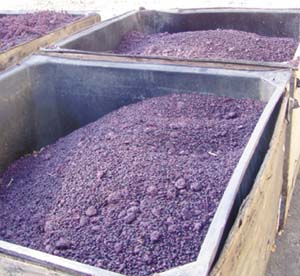Don’t Miss Live Online Workshop on Mastering Hybrid Grape Winemaking February 20. Three hours of tips and techniques. Also available later as video replay. Click here for event and registration details.
Alison Crowe
Posts
-
 Wine-wizard
Wine-wizard
Can MLF bacteria become airborne?
-
 Wine-wizard
Wine-wizard
Can I fix a re-fermented wine?
-
 Wine-wizard
Wine-wizard
Refermentation, malo on the move: Wine Wizard
-
 Wine-wizard
Wine-wizard
Why are my TA readings off?
-
 Wine-wizard
Wine-wizard
Training New Vines and Bringing Up Tannins: Wine Wizard
-
 Wine-wizard
Wine-wizard
Wine Wizard Revealed & Top 10 Winemaking Questions
-
 Wine-wizard
Wine-wizard
What is the best way to clean an old wine press I just acquired?
-
 Wine-wizard
Wine-wizard
What could cause the acid levels in my wine to rise as it ages?
-
 Wine-wizard
Wine-wizard
I’ve heard both “yes” and “no” on soaking corks before bottling… So to soak or not to soak?
-
 Wine-wizard
Wine-wizard
A friend recommended microwaving corks in a bowl of water to sanitize them…
-
 Wine-wizard
Wine-wizard
Sanitation Sanity: How often should wine equipment be sanitized?
-
 Wine-wizard
Wine-wizard
What is the best way to store plastic fermentation tubs and keep them clean?
-
 Wine-wizard
Wine-wizard
How long should I age wines made from fruit other than grapes?
-
 Wine-wizard
Wine-wizard
When using oak cubes in a recipe from concentrate, at what stage in the process should they be added?
-
 Wine-wizard
Wine-wizard
Bulk vs. Bottle Aging
-
 Wine-wizard
Wine-wizard
I noticed an oily film on top of my Norton before I racked it. What should I be worried about and how do I fix it?
-
 Wine-wizard
Wine-wizard
I think I might have ruined 350 bottles of my Merlot when I stored it in a wine locker and the odor and taste changed. What do you think happened?
-
 Article
Article
The Pomace Predicament
Pomace is the general term for any solid material — such as the skins, pulp and seeds — leftover after wine or juice has been made. Here
-
 Wine-wizard
Wine-wizard
Is there any way to save a flat and watery wine I made?
-
 Wine-wizard
Wine-wizard
I made some wine using coffee as an ingredient and I was wondering what happens to the caffeine during fermentation?
-
 Wine-wizard
Wine-wizard
Could you provide me some ideas on an easy and cost effective way to properly frame a stand for my barrels?
-
 Wine-wizard
Wine-wizard
How do you sterile filter your wine?
-
 Wine-wizard
Wine-wizard
I made a mead that has a sour taste. Will this mellow out with age?
-
 Wine-wizard
Wine-wizard
Where can an amateur buy a larger sized cork for a 3-liter bottle?
-
 Wine-wizard
Wine-wizard
Can you use a spare refrigerator on a low setting to store red wines?